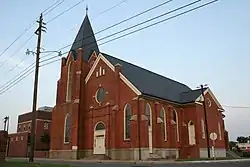St. Joseph's African Methodist Episcopal Church
St. Joseph's African Methodist Episcopal Church is a historic African Methodist Episcopal church building located at Fayetteville Street and Durham Expressway in the Hayti District, now a neighborhood of Durham, Durham County, North Carolina.
St. Joseph's African Methodist Episcopal Church | |
 | |
  | |
| Location | Fayetteville St. and Durham Expwy., Durham, North Carolina |
|---|---|
| Coordinates | 35°59′11″N 78°53′53″W |
| Area | 1.5 acres (0.61 ha) |
| Built | 1891 |
| Architect | Leary, Samuel L. |
| Architectural style | Late Victorian, Eclectic |
| NRHP reference No. | 76001319[1] |
| Added to NRHP | August 11, 1976 |
Started soon after the American Civil War by black workers, the Hayti District became a well-developed and self-sufficient black community, complete with a variety of businesses and services, including theatre, hospital and hotel.[2]
The church was built in 1891, by a congregation that had organized in 1869, brought together in meetings in a "brush arbor" organized by Edian Markham, a former slave and AME missionary. After building a couple of wooden structures, the congregation raised money for this brick church, including funds donated by white philanthropists.[3][4]
Edian Markham is buried in Geer Cemetery.
It was added to the National Register of Historic Places in 1976.[1]
It is now used by the St. Joseph Historic Foundation as the Hayti Heritage Centre for cultural and community activities.[3]
References
- "National Register Information System". National Register of Historic Places. National Park Service. March 13, 2009.
- Washington, Booker T. "Durham, North Carolina, A City of Negro Enterprises," The Booker T. Washington Papers, Volume 11: 1911-12. Louis R. Harlan and Raymond W. Smock, eds. Urbana: University of Illinois Press, 1981. pp. 56-64
- Louis Allston, "The History of St. Joseph’s AME Church and the St. Joseph’s Historic Foundation", St. Joseph Historic Foundation, 2012, accessed 19 June 2012
- Mary Alice Hinson and John B. Flowers III (April 1976). "St. Joseph's African Methodist Episcopal Church" (pdf). National Register of Historic Places - Nomination and Inventory. North Carolina State Historic Preservation Office. Retrieved 2014-10-01.
External links
- Hayti Heritage Center - St. Joseph's Historic Foundation
- Hayti Heritage Center at Google Cultural Institute

